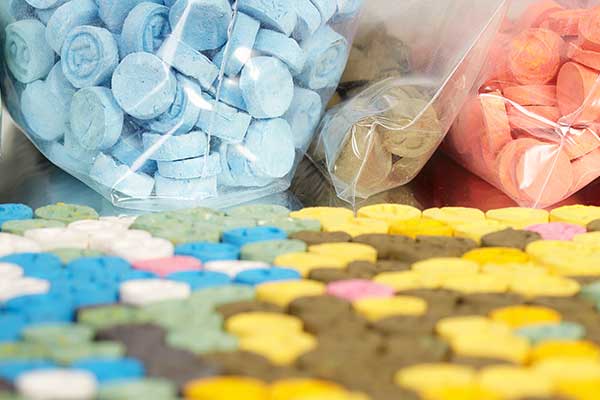Festival-goers in New Zealand were taking what they thought was pure MDMA. But days after ingestion, the drugs were leading to hundreds of people developing mysterious symptoms like seizures, nausea and anxiety. In December 2020, the government implemented an evidence-based, yearlong pilot program to address the growing crisis: legalizing public drug-checking services to help people know what’s in the pills they intend to consume at festivals. Now, after just a few months, Minister for Health Andrew Little has announced that the interim legislation will be made permanent.
New Zealand is the first country in the world to fully legalize—in the sense of explicitly providing for—these services. (Drug-checking is sanctioned in Switzerland based on the interpretation of preexisting law, while the Netherlands has an office-based drug-checking program that receives government funding; festival services meanwhile operate in legal grey areas, with at least tacit permission, in countries such as Portugal, the United Kingdom and the United States.)
“One of the big risks of drug use is that the user doesn’t know what they are consuming and that the substance is something more dangerous,” Sarah Helm, executive director of New Zealand Drug Foundation, told Filter.
NZ Drug Foundation provides logistical and advocacy support to the volunteer-run drug-checking organization KnowYourStuffNZ—which is the country’s principle provider of these services, and was appointed by the Ministry of Health to administer the pilot.
“We are very happy that after seven years of operating in a legal grey area, we and our clients now have some legal certainty,” Wendy Allison, the founder and managing director of KnowYourStuffNZ, told Filter. “We’ve proven that drug checking reduces harm and the demand for the service is skyrocketing.”
The drug-checking processes and technologies used by KnowYourStuffNZ have the ability to identify thousands of different substances. People who wish to ensure their bodily autonomy by learning the content of pills, powders, liquids and crystals they intend to consume can do so if they have a sample size of 5-10mg.
The volunteers who perform this service then provide “non-judgmental harm reduction advice” based on the results—not telling the person not to ingest the substance if it isn’t “pure,” but simply advising them on the risks.
Drug-checking has helped uncover the gaps between what New Zealanders thought they were consuming and what they actually were consuming. In 2019-2020, volunteers tested 1,368 samples. Recently, “a higher rate of a type of drug called cathinones [is] being picked up in our drug checking, when the substance people thought they had was MDMA,” Helm said. Cathinones—a category of stimulants known colloquially as “bath salts”—have been linked to hospitalizations and some deaths.
“One of the best parts of legalizing the drug checking service has been the public discussion and awareness.”
Research conducted by Victoria University of Wellington found that 68 percent of surveyed New Zealand festival-goers who used drug-checking services changed their behavior as a result—for example, by reducing the amount of drugs they consumed or disposing of some of the drugs tested. Eight-seven percent of people surveyed said that as a result of talking to the volunteers, they themselves better understood the drugs they planned to use.
“One of the best parts of legalizing the drug-checking service has been the public discussion and awareness that it has created,” Helm said. “It has also given New Zealanders a real practical example of benefit of harm reduction through experience.”
New Zealand was also one of the first countries in the world to have a national state-sponsored syringe service program. Little stated in a speech to Parliament last year that the New Zealand government views drug policy as a public health issue, emphasizing the importance of open discussions.
“Having drug-testing services around with the drug-testing personnel not susceptible to prosecution means that they can actually have a conversation with those drug users, provide some education, provide some information, and provide some advice,” Little said.
“It is time for us to consider alternative approaches because, for far too long, what we’ve been doing year after year, decade after decade, has not been working.”
In order to achieve the best outcomes, New Zealand’s drug-checking services will still need more support than they currently enjoy. “If drugs are to be truly treated as a public health issue, the government needs to stop relying on an unfunded, volunteer-run model and consider appropriate resourcing to meet that demand,” Allison said.
The volunteer-run testing program “cannot meet current demand, and cannot attend all major events, nor provide regular accessible drug checking at static clinics,” Helm added. “Funding and policy development should help us reach more people who use drugs.”
If that happens, Helm believes that supporting further harm reduction approaches to drug use will have profound impacts on the health of both people who use drugs and people who don’t.
“Both drug checking and needle exchange can reduce harm and save lives,” Helm said. “We should favor harm reduction and health-based approaches over punitive ones, given there is no evidence that convictions deter use. Criminalizing users has driven problems into the shadows and made it harder for people to seek help.”
Corrections, May 5: This article was updated to clarify the status of New Zealand’s law and the relationship betweeen NZ Drug Foundation and KnowYourStuffNZ, and to add Allison’s comments.
Photograph via National Institute on Drug Abuse





Show Comments